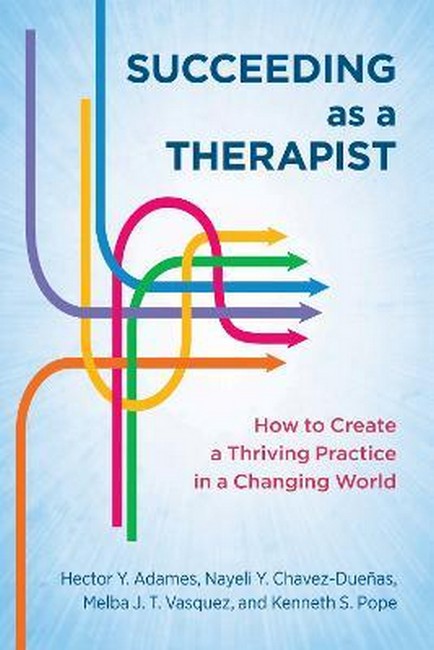Hector Y. Adames, PsyD, received his doctorate in Clinical Psychology from Wright State University in Ohio and completed his pre-doctoral internship at the Boston University School of Medicine's Center for Multicultural Training in Psychology (CMTP). Currently, he is a licensed psychologist and a Professor at The Chicago School of Professional Psychology, Chicago Campus and the Co-Director of the IC-RACE Lab (Immigration Critical Race and Cultural Equity Lab). He has earned several awards including the 2018 Distinguished Emerging Professional Research Award from The Society for the Psychological Study of Culture, Ethnicity, and Race, a Division of the American Psychological Association. Nayeli Y. Chavez-Duenas, PhD, received her doctorate in Clinical Psychology from Southern Illinois University at Carbondale. She is a Professor at The Chicago School of Professional Psychology (TCSPP) where she serves as the faculty coordinator for the concentration in Latinx Mental Health in the Counseling Psychology Department. She is the Co-Director of the IC-RACE Lab (Immigration Critical Race and Cultural Equity Lab). Her research focuses on colorism, skin-color differences, parenting styles, immigration, unaccompanied minors, multiculturalism, and race relations. She has earned a number of awards including the 2018 American Psychological Association (APA) Distinguished Citizen Psychologist Award. Melba J.T. Vasquez, PhD, ABPP, is in independent practice in Austin, Texas. She served as President of the American Psychological Association in 2011 and is the first Latina and Woman of Color of 120 presidencies of APA to serve in that role. Dr. Vasquez also served a term on the APA Board of Directors. She obtained her doctorate in counseling psychology from the University of Texas at Austin in 1978. She is a coauthor of a monograph, Multicultural Therapy: A Practice Imperative and is coauthor of six editions of Ethics in Psychotherapy and Counseling: A Practical Guide. Dr. Vasquez has also published about 100 book chapters and journal articles in the areas of professional ethics, ethnic minority psychology, psychology of women, counseling and psychotherapy, and leadership. She has served on numerous editorial boards. Kenneth S. Pope, PhD, ABPP, is a licensed psychologist. A Fellow of the Association for Psychological Science (APS), he served as chair of the Ethics Committees of the American Board of Professional Psychology and the American Psychological Association (APA). He received the APA Award for Distinguished Contributions to Public Service, the APA Division 12 Award for Distinguished Professional Contributions to Clinical Psychology, the Canadian Psychological Association's John C. Service Member of the Year Award, and the Ontario Psychological Association's Barbara Wand Award for significant contribution to excellence in professional ethics and standards.
Request Academic Copy
Please copy the ISBN for submitting review copy form
Description
Dedications The Authors Preface Acknowledgments Part I: Initial Preparation 1. Creating a Practice That Matches You, Your Values, and Your Vision 2. Creating a Realistic Business Plan 3. Finding the Right Attorney 4. Finding the Right Professional Liability Insurance 5. Finding the Right Office 6. Finding the Right Accountant 7. Finding the Right Software and System for Scheduling, Billing, Forms, Client Communication, and Documentation Part II: Finding Clients and Helping Clients Find You 8. Creating a Website, Business Cards, and Stationary 9. Advertising Ethically, Efficiently, Effectively, and Economically 10. Getting onto Insurance Panels- But Do You Want to Do That? 11. Building and Maintaining a Presence on Social Media Part III: Records 12. Creating a Thoughtful and Useful Client Record 13. Privacy, Confidentiality, and Privilege 14. Responding to a Subpoena and Law Enforcement Part IV: Preparing for Urgent and Emergency Situations 15. Office Safety Measures and Precautions 16. Suicide Risk 17. Clients Who Pose a Risk of Danger to a Third Party 18. Assessing and Responding to Interpersonal Violence 19. Reporting Child Abuse and Reasonable Suspicions of Child Abuse 20. Assessing and Responding to Possible Abuse of Elderly, Vulnerable, Disabled, or Dependent Adults 21. When the Therapist is Stalked, Targeted, or Threatened by a Client or Someone in the Client's Life Part V: Taking Care of Yourself & Your Practice 22. Nine Keys to Thinking Clearly and Making Good Decisions About Your Practice 23. Eight Common Missteps That Can Lead to Disaster 24. Navigating Boundaries 25. Addressing the Hazards of Loneliness 26. Addressing the Hazards of Vicarious Trauma 27. Navigating and Nourishing Personal Relationships 28. Asking for Help When We Need It 29. Creating a Practice Grounded in Human Rights 30. Creating, Embracing, and Serving Communities 31. Applying for American Board of Professional Psychology (ABPP) Certification Part VI: Managing the (Sometimes) Unexpected 32. When the Therapist Becomes Pregnant 33. When the Therapist Becomes Ill 34. What to Do When You've Made a Mistake 35. What to Do (and NOT Do) When Facing an Ethics, Licensing, or Malpractice Complaint Part VII: Endings- Planned and Unplanned 36. Successful, Unsuccessful, and Incomplete Terminations 37. Closing or Selling a Practice 38. Creating a Useful Professional Will Part VIII: Resources A. Professional Guidelines Relevant to Practitioners B. The Clinical Interview with Immigrants (CIWI) C. Coping with Subpoenas or Compelled Testimony for Records, Test Data, or Test Materials D. Sample Professional Will E. Sample Form of Information for Professional Executor References About the Authors Author Index Subject Index

